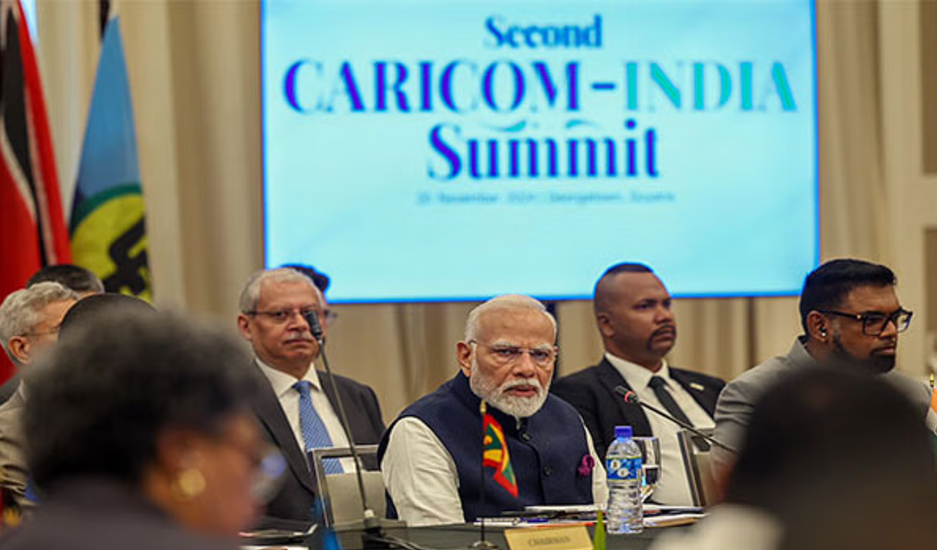Navigating the Caribbean Community (CARICOM) & India- CARICOM relations.
- TheSoulGuide
- Nov 24, 2024
- 4 min read
In November 2024, PM Modi visited Georgetown, Guyana for the second India- CARICOM summit. PM underscored that India stood firmly for giving voice to the concerns of the Global South. He also urged members to join the global initiatives led by India such as the International Solar Alliance, Coalition for Disaster Resilient Infrastructure, Mission LiFE and Global Biofuel Alliance. Let's know about CARICOM?

What is CARICOM?
The Caribbean Community (CARICOM) is a regional organization founded with the primary objective of advancing economic integration, fostering cooperation, and implementing coordinated policies among the nations of the Caribbean. This document provides a comprehensive analysis, encompassing aspects such as history, geography, economics, and India's involvement, among other topics.
The establishment of CARICOM was formalized on 4 July 1973, when the four founding nations Barbados, Guyana, Jamaica, and Trinidad & Tobago signed the Treaty of Chaguaramas. This organization emerged from previous regional integration initiatives, specifically the West Indies Federation (1958-1962) and the Caribbean Free Trade Association (CARIFTA). As time progressed, additional countries became members, resulting in CARICOM evolving into a 15-member organization, which also includes 5 associate members and several observer states.
CARICOM member states are located in the Caribbean Basin and include a mix of island nations and mainland territories in Central and South America. The names are: Antigua and Barbuda, Bahamas, Barbados, Belize, Dominica, Grenada, Guyana, Haiti, Jamaica, Montserrat, Saint Kitts and Nevis, Saint Lucia, Saint Vincent and the Grenadines, Suriname
Trinidad and Tobago,
Associate Members: Anguilla, Bermuda, British Virgin Islands, Cayman Islands, and Turks and Caicos Islands.
Objectives: To empower member states to fully capitalize on the advantages of economic integration and collaboration, to promote trade among members, and to engage collectively in negotiations within international trade organizations.
Common Market: The establishment of the CARICOM Single Market and Economy (CSME) has facilitated the unrestricted movement of goods, services, capital, and labor.
Key Sectors: The primary pillars of CARICOM economies include tourism, agriculture, energy, and financial services.
Trade:
Primary exports include sugar, bananas, petroleum, natural gas, bauxite, and tourism services. Key trading partners consist of the United States, the European Union, and China.
Challenges faced include small economies with a significant reliance on imports, susceptibility to climate change, and a heavy dependence on tourism.
Languages and Culture:
The predominant segment of the population communicates in English, while there are notable communities of French speakers (notably in Haiti) and Dutch speakers (primarily in Suriname). The region boasts a rich cultural diversity influenced by African, Indian, European, and indigenous heritages.
Global Role of CARICOM:
In light of climate change, rising sea levels, and natural disasters, CARICOM champions the unique needs and vulnerabilities of small economies in international discussions.
Climate Action: The organization actively participates in the Paris Agreement and other initiatives focused on energy and disaster management.
UN Relations: Member states of CARICOM frequently align their votes on significant matters, including decolonization, human rights, and trade.
CARICOM's Contribution to Regional Integration
Human Mobility:
CARICOM has enacted the Caribbean Community Skilled Persons Act, which facilitates the movement of skilled individuals among member states without the necessity of work permits. Additionally, there will be an expansion of free movement for workers in other sectors.
Education:
The organization has established the Caribbean Examinations Council, serving as a regional body for examinations. It promotes collaboration within the region, particularly among universities, as demonstrated by the University of the West Indies.
Health:
The Caribbean Public Health Agency (CARPHA) has been developed to address regional health challenges, including non-communicable diseases and vector-borne illnesses.
Disaster Management:
The Caribbean Disaster Emergency Management Agency (CDEMA) is responsible for coordinating responses to hurricanes and earthquakes, along with other disaster management activities.
India's Relationship with CARICOM
India demonstrates a strong commitment to its partnership with CARICOM through various avenues, including trade, diplomacy, and development assistance. The following are some notable aspects:
Economic Relations:
India has progressively enhanced its trade relations with CARICOM member states, particularly in sectors such as energy, pharmaceuticals, and textiles.
Countries within CARICOM, such as Trinidad and Tobago and Guyana, host significant Indian diaspora populations, which further enrich trade and cultural interactions.
Development Support:
The Indian Technical and Economic Cooperation (ITEC) program facilitates capacity-building initiatives in CARICOM nations.
During the COVID-19 pandemic, India provided vaccines as part of the Vaccine Maitri initiative.
Cultural Exchange:
The CARICOM nations with significant Indian populations include Guyana, Suriname, and Trinidad and Tobago, where Indian festivals such as Diwali are celebrated, fostering rich cultural interactions.
Diplomatic Engagements:
India collaborates with CARICOM within multilateral organizations like the United Nations, focusing on issues such as climate change, sustainable development, and South-South cooperation. Notable high-level interactions include participation in the India-CARICOM leaders' summit held in 2019.
Political and Social Dimensions:
Political Cooperation: CARICOM unifies its stance in international discussions, advocating for the interests of small island developing states (SIDS) with a focus on climate change, disaster resilience, and equitable trade practices.
stay tuned for more.
Get membership to feature your article. Check here.

Comentarios